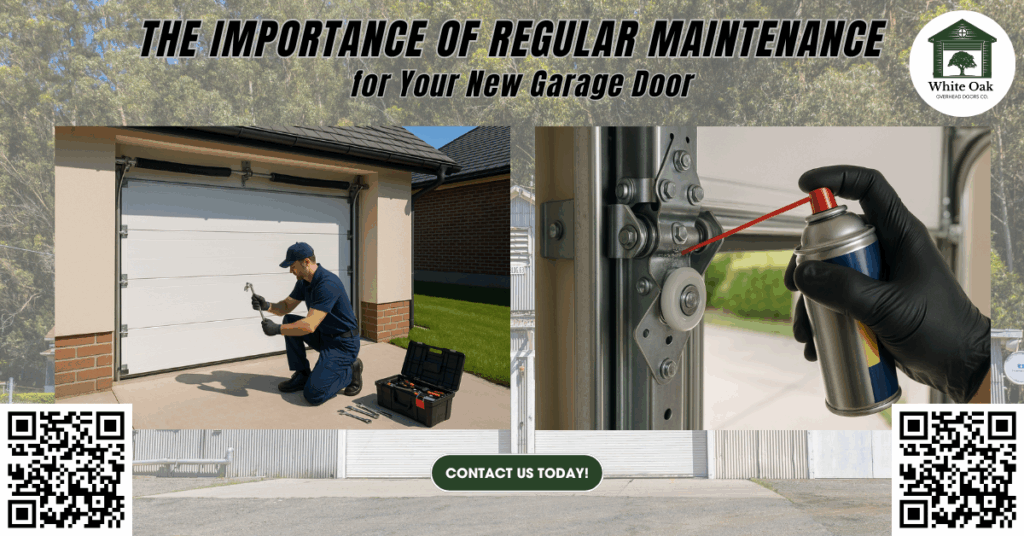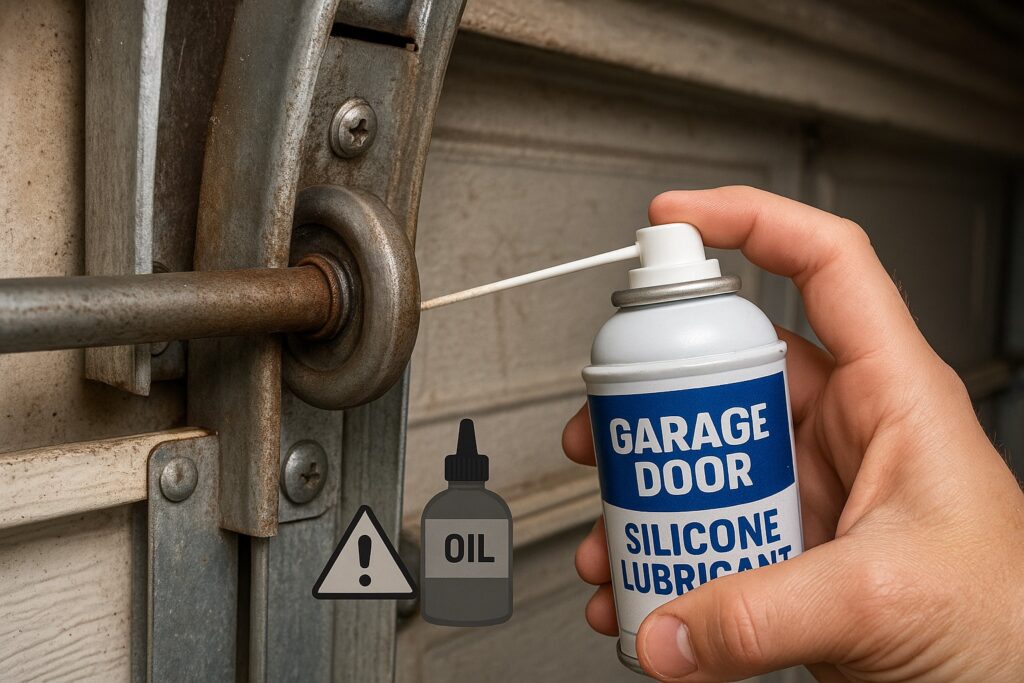The Importance of Regular Maintenance for Your New Garage Door

A few months ago, in Houston’s Heights neighborhood, David O’Mara called us about his new garage door, a stylish, insulated craftsman garage door with smart features and a steel-reinforced frame. He had it installed just under a year ago and was thrilled with the upgrade at first. But one chilly February morning, his garage door refused to open. The culprit? A worn cable drum and a misaligned track due to a lack of maintenance. What began as a minor oversight quickly snowballed into a costly repair involving labor costs, parts, and emergency service fees.
This scenario isn’t uncommon. According to the International Door Association, over 70% of garage door failures result from inadequate or ignored maintenance. New garage doors are investments that offer enhanced curb appeal, smart technology, and energy-efficient features. But even the most advanced system, whether it’s a custom wooden garage door or a steel sectional model, needs regular service to stay safe, quiet, and reliable.
If you’re a homeowner in Houston or the surrounding area, this comprehensive guide from White Oak Overhead Doors Co. will explain why taking care of your new garage door is essential. We’ll explore key maintenance practices, the true cost of neglect, and how regular upkeep protects your home, improves functionality, and extends your garage door’s lifespan.
Why Maintenance Matters for a New Garage Door
Many homeowners mistakenly assume that a brand-new garage door, especially one equipped with modern smart features or crafted from premium materials like wood or fiberglass, requires no upkeep. However, even the most durable garage doors, including steel doors or composite models, face everyday stressors that can lead to premature wear or malfunction.
Your Garage Door Is the Largest Moving Part of Your Home
Most garage doors weigh between 150 and 400 pounds, depending on the materials, size, and insulation. Sectional garage doors made of insulated steel may be heavier due to their construction and layered design. Every time you press the opener, springs, cables, and rollers are activated to smoothly raise and lower this enormous load. This continuous motion can cause parts to shift, vibrate, or loosen over time, especially with heavy daily use. Without regular inspection and tightening, your system could become unbalanced, noisy, or worse, unsafe.
It Protects More Than Your Car
The garage isn’t just a place for your vehicle, it’s often used as storage for tools, bicycles, fitness equipment, or even as an additional entrance to your home. A well-functioning garage door serves as a vital security barrier, protecting your valuables and helping regulate temperature. Poor maintenance can lead to vulnerabilities, such as faulty openers, broken springs, or non-functional safety sensors that compromise your house’s security.
Maintains the Value of Your Investment
New garage doors are not cheap. Depending on size, style, material, and features, garage door installation costs can range from $1,000 to $4,000 or more. A high-end custom garage door, like those from Wayne Dalton or other leading brands, can cost even more when you factor in smart openers, safety features, and professional installation. Regular maintenance ensures this significant investment lasts for decades, delivering a solid return on investment and sparing you the cost of premature garage door replacement.
Key Maintenance Tasks for Your Garage Door
To extend the life and reliability of your new garage door, a comprehensive maintenance checklist is crucial. Let’s walk through the top tasks every homeowner should perform or schedule with a garage door professional.
1. Visual Inspection of All Components
Every few months, visually inspect springs, cables, rollers, and tracks. Look for signs of rust, fraying, bending, or wear. Wooden garage doors, especially, can show signs of weather damage or delamination over time. Keep an eye out for chipped paint, moisture intrusion, or swelling. For steel doors, inspect for rust spots, which may require priming and repainting to prevent further corrosion.
2. Lubricate All Moving Parts
Proper lubrication ensures quieter operation and reduces friction that can wear out parts quickly. Use a high-quality silicone or lithium-based spray (not WD-40) to lubricate steel rollers, hinges, bearings, and springs. Do this every 6 months. Avoid greasing plastic parts or opener belts unless your garage door guides specifically recommend it.

3. Balance and Spring Tension Adjustment
A properly balanced garage door should stay in place when lifted halfway. If it sags or flies upward, the torsion or extension springs may need adjustment. Springs bear most of the weight and are critical for smooth operation. A misbalanced door strains the garage door opener and can cause early motor burnout or create dangerous spring failure. Only trained professionals should handle spring adjustments due to the high tension involved.
4. Test the Safety Features
Most modern openers include auto-reverse sensors to prevent the door from closing on a person, pet, or object. To test, place an object like a wooden block in the door’s path. If the door doesn’t reverse immediately, the sensors may need cleaning, realignment, or replacement. Testing these features monthly ensures your garage door remains compliant with federal safety standards.
5. Inspect and Maintain the Tracks
Garage door tracks should be clean, aligned, and securely fastened. Dirty or bent tracks can cause noisy, uneven movement or even derailment. A track that shifts even slightly from its mounting position can cause vibration and increased wear on rollers and cables. Avoid lubricating the tracks directly; instead, clean them with a dry cloth and inspect them for dents or obstructions.
How Often Should Garage Doors Be Maintained?
While your new garage door may feel solid today, small issues can build up over time. Here’s a suggested maintenance schedule for most homes:
- Monthly: Visual checks for wear, sensor testing, and cleaning.
- Every 6 months: Lubrication of springs, rollers, and hinges; tightening of bolts.
- Annually: Professional tune-up, door balance test, and full inspection.
- Immediately: If you hear strange noises, see damaged cables, or notice slow or jerky motion.
Commercial doors, or those in high-traffic homes, may require quarterly inspections due to the higher number of open/close cycles. Remember, even luxury materials like wood or aluminum benefit from routine care to withstand Houston’s heat, humidity, and occasional cold weather.
Red Flags That Demand Immediate Service
While maintenance can prevent issues, it’s equally important to recognize early signs of trouble. Ignoring the following symptoms can lead to serious damage, increased labor costs, or unsafe conditions:
- Loud grinding, squeaking, or popping noises indicate worn rollers, hinges, or misaligned tracks.
- Door is uneven or sagging: Possible spring failure or worn cables.
- Remote unresponsive or wall switch not working: Could be due to dead batteries, faulty wiring, or opener malfunction.
- Delayed response after pressing the opener button: May signal opener motor fatigue or programming issues.
- Visible damage to panels or insulation: Impacts energy efficiency and may expose the interior of your garage to pests or water damage.
For instance, one homeowner in Houston Heights noticed a slight delay in her smart opener’s response. A quick check revealed a misaligned sensor and dead backup battery—both easy fixes that prevented larger system failures.
Maintenance Enhances Home Safety
Garage doors may look harmless, but they account for over 20,000 injuries each year in the U.S., many of which are preventable. Garage door springs are under immense tension and can snap if corroded or damaged. Broken cables can cause doors to fall suddenly. Regular inspections by qualified technicians ensure that key safety systems, such as cable drums, springs, and opener auto-reverse features, are always functioning.
Homeowners with children or pets should take extra caution. A simple monthly safety sensor test and visual inspection can help protect your loved ones from harm.
Boosts Energy Efficiency and Comfort
New garage doors, especially insulated models, help reduce heating and cooling bills. The insulation (often measured by R-value) prevents heat gain in the summer and retains warmth in the winter. However, cracked weather seals, warped panels, or broken insulation layers can reduce effectiveness.
Materials like vinyl, fiberglass, and steel with polyurethane foam cores offer excellent energy efficiency, but they still require routine checks. Proper door alignment and sealing ensure your garage space stays comfortable year-round, especially important in Houston’s fluctuating climate.
DIY vs. Professional Maintenance: What’s the Difference?
There are several maintenance tasks homeowners can perform safely, such as cleaning the door, visually inspecting components, and testing openers. However, more complex tasks like spring replacement, cable inspection, and track alignment should be handled by licensed professionals.

Our White Oak Overhead Doors Co. technicians are trained to service all types of garage door systems, be it belt-drive openers, chain-driven systems, or smart garage door openers connected via Wi-Fi or security cameras. Attempting DIY on high-tension components without experience can result in injury or property damage.
Hiring a professional ensures thorough diagnostics, expert repairs, and safe adjustments, giving you peace of mind that your new door will operate flawlessly for years to come.
Choosing the Right Maintenance Partner
Your garage door is only as reliable as the team that maintains it. When selecting a service provider, prioritize companies that:
- Offer comprehensive garage door services, including repairs, replacements, and opener upgrades.
- Work with all major garage door brands like Wayne Dalton, LiftMaster, and Chamberlain.
- Provide transparent pricing and installation cost breakdowns.
- We are licensed, insured, and well-reviewed by local homeowners.
At White Oak Overhead Doors Co., we take pride in serving the Houston community with timely, affordable, and trustworthy maintenance services. Whether it’s a sleek aluminum door or a handcrafted wood garage door, we treat every project with the same commitment to excellence.
How Can White Oak Overhead Doors Co. Help You?
As Houston’s trusted provider of garage door services, White Oak Overhead Doors Co. offers tailored maintenance plans to match your unique needs. Whether you have a newly installed carriage house door or an insulated steel door with smart technology, our team will keep it running smoothly, safely, and quietly.
We offer:
- Comprehensive multi-point inspections
- Opener troubleshooting and battery replacement
- Spring and cable testing
- Sensor realignment
- Weather seal replacement
- Smart feature calibration
- Safety feature validation
📍 Address: 1440 Studemont St, Houston, TX 77007
📞 Phone: (832) 990-1595
🌐 Book Online: whiteoakoverheaddoors.com/contact-us
Call us today to set up a one-time maintenance visit or enroll in a seasonal service plan tailored for your garage’s material, style, and usage level. Let us protect your investment and keep your home safe and secure.
Final Thoughts
Your new garage door is more than just an entryway, it’s a vital part of your home’s security, comfort, and curb appeal. While modern doors are built to last, their performance hinges on regular maintenance. Simple tasks like lubrication, sensor testing, and visual inspections can prevent serious repairs, increase energy efficiency, and add years to your door’s lifespan.
Don’t wait until something breaks. Whether you’re dealing with steel doors, wooden designs, or smart garage door openers, staying proactive ensures peace of mind. Trust a reliable partner like White Oak Overhead Doors Co. to keep your system in top condition year after year.
Take the next step today, schedule your inspection, and give your garage door the attention it deserves.
Frequently Asked Questions (FAQs)
1. How long should a new garage door last with proper maintenance?
A well-maintained new garage door can last 15 to 30 years, depending on the material and usage. Wood and steel doors tend to have different lifespans, with steel and composite materials typically lasting longer. Regular inspections, lubrication, and prompt repairs help maximize longevity. The opener system may need replacement sooner, around every 10–15 years.
2. Does a new garage door increase home value?
Yes, installing a new garage door can provide one of the highest returns on investment for home improvement projects. According to Remodeling Magazine, garage door replacement has a return of up to 94% or more. It boosts curb appeal, enhances energy efficiency, and modernizes your home’s appearance, all factors that attract buyers. Smart features and custom designs can add even more value.
3. What’s the best garage door material for hot and humid climates like Houston?
For Houston’s heat and humidity, steel with polyurethane insulation, fiberglass, or composite doors are excellent choices. These materials resist warping, rust, and delamination better than wood and require less upkeep. Vinyl doors are also durable and moisture-resistant, though they may lack the design flexibility of wood or steel. Always consider R-value for insulation and UV resistance when selecting materials.
4. Can I use my existing opener with a new garage door?
In many cases, yes—but it depends on the age, brand, and compatibility of your current garage door opener. If your opener is over 10 years old or lacks modern safety features, it’s usually recommended to upgrade it during a new garage door installation. Newer doors often work best with openers that support smart features, improved energy efficiency, and quieter operation. A professional installer can help assess compatibility.
